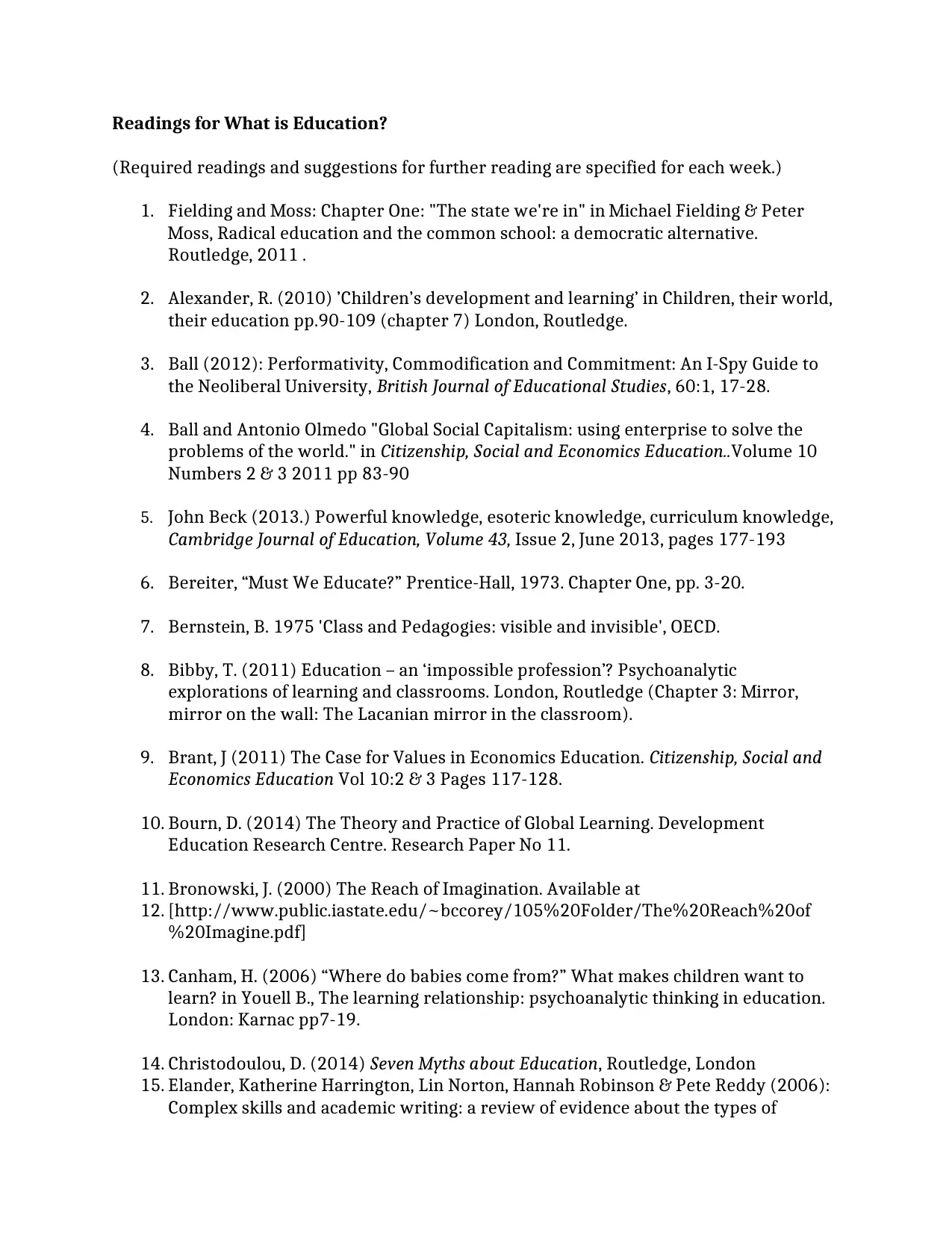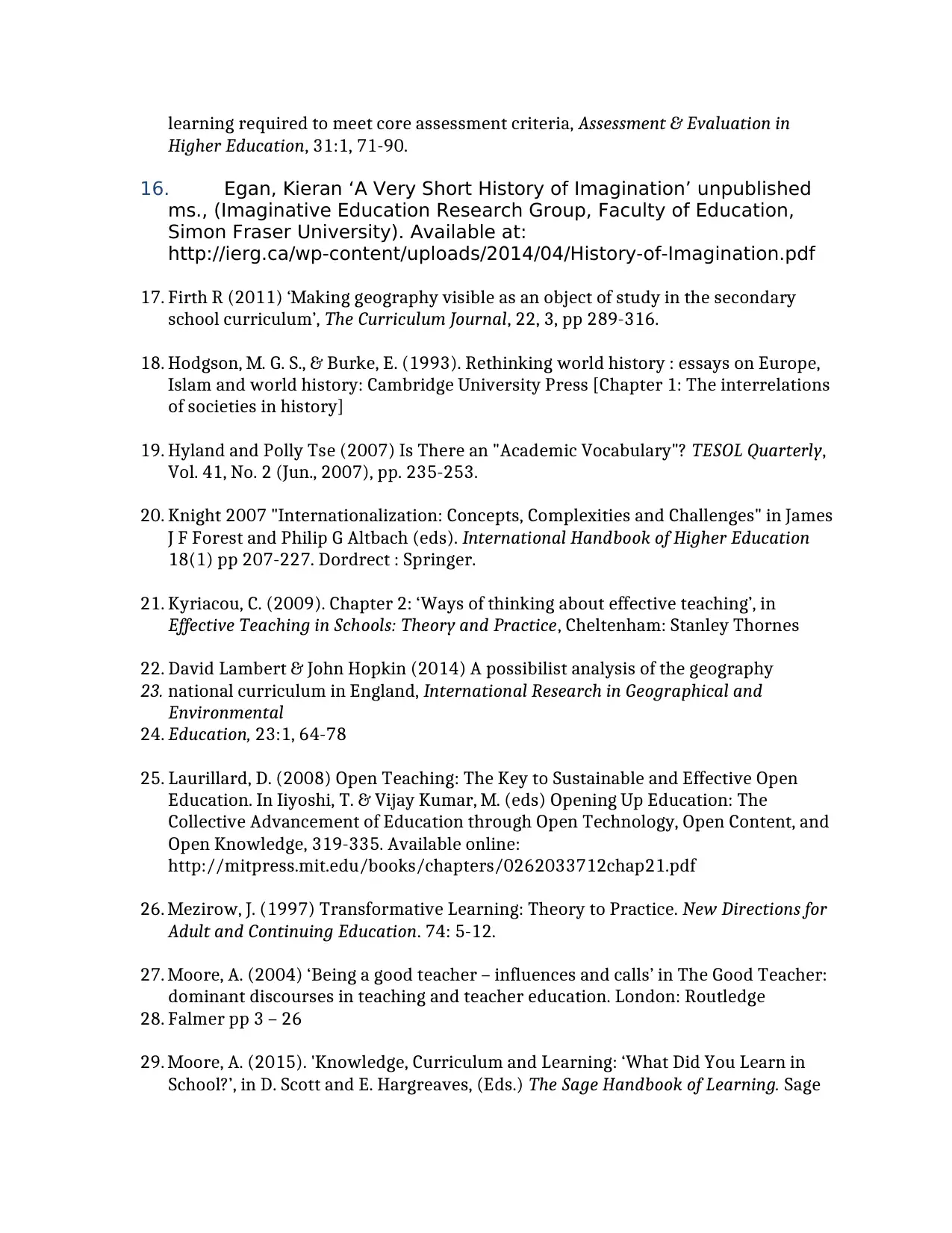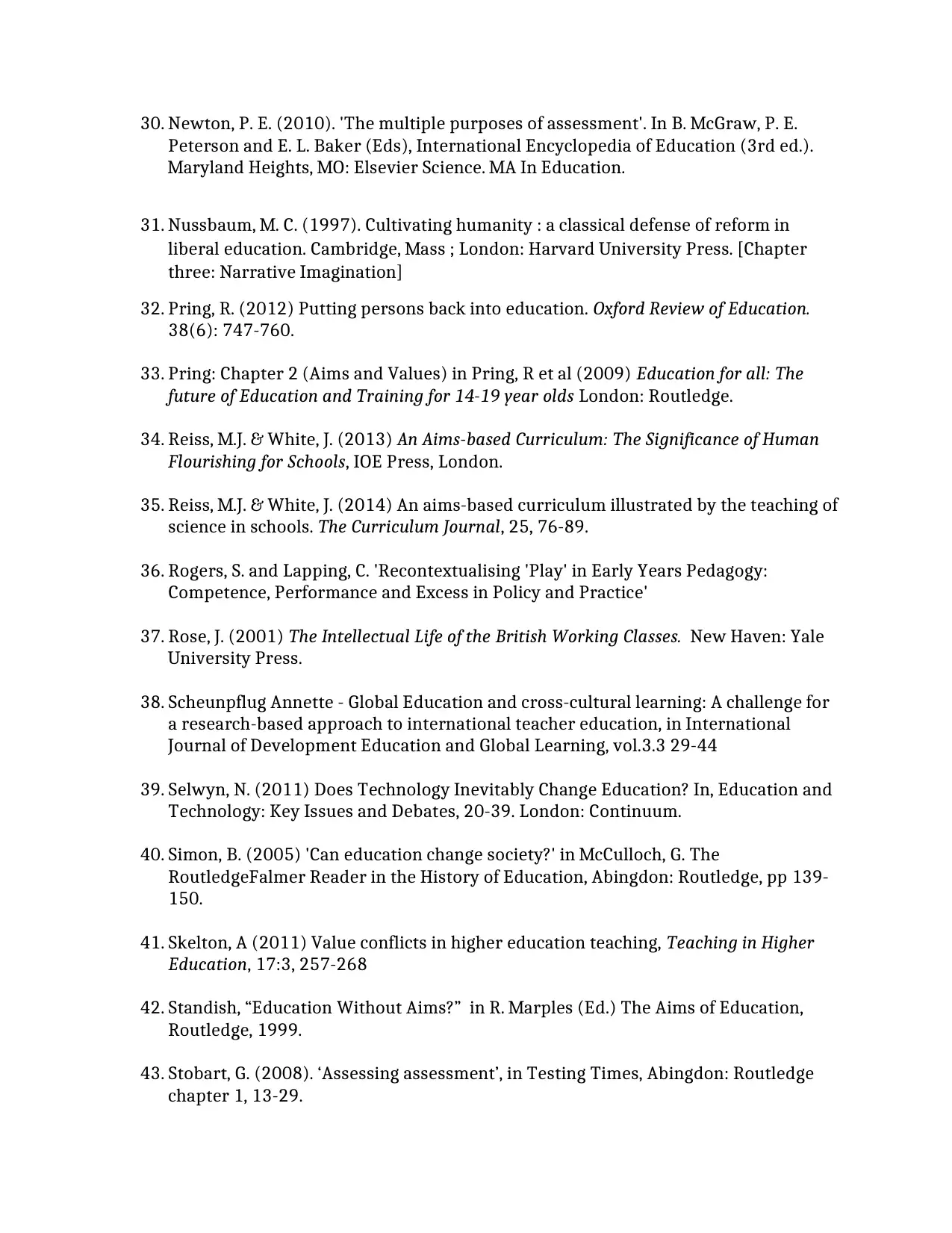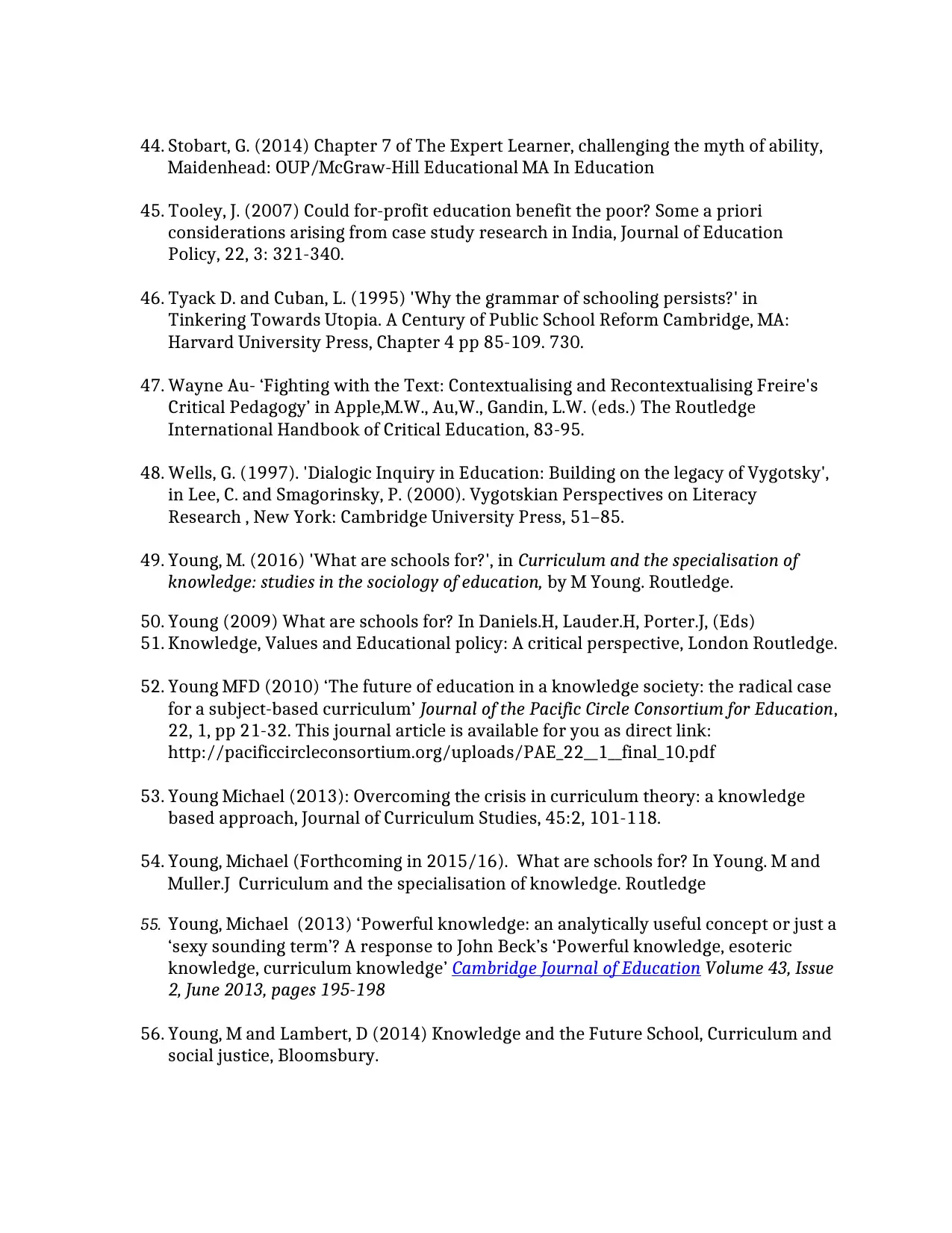Analysis of Readings: Education Course, Semester 1, University X
VerifiedAdded on 2019/09/18
|4
|1719
|364
Homework Assignment
AI Summary
This assignment provides a comprehensive list of required and suggested readings for an education course. The readings cover a wide range of topics, including curriculum theory, educational philosophy, pedagogy, and the impact of globalization and technology on education. The list includes seminal works by authors such as Michael Young, Basil Bernstein, and Kieran Egan, exploring key concepts such as powerful knowledge, performativity, and the aims of education. The readings also delve into areas like assessment, the role of imagination, and the relationship between education and society. This collection of texts offers a multifaceted perspective on the complexities and challenges within the field of education, encouraging critical analysis and a deeper understanding of the subject matter. The provided list is designed to facilitate a thorough exploration of the core principles and debates in education, providing a strong foundation for further study and research.

Readings for What is Education?
(Required readings and suggestions for further reading are specified for each week.)
1. Fielding and Moss: Chapter One: "The state we're in" in Michael Fielding & Peter
Moss, Radical education and the common school: a democratic alternative.
Routledge, 2011 .
2. Alexander, R. (2010) ’Children’s development and learning’ in Children, their world,
their education pp.90-109 (chapter 7) London, Routledge.
3. Ball (2012): Performativity, Commodification and Commitment: An I-Spy Guide to
the Neoliberal University, British Journal of Educational Studies, 60:1, 17-28.
4. Ball and Antonio Olmedo "Global Social Capitalism: using enterprise to solve the
problems of the world." in Citizenship, Social and Economics Education..Volume 10
Numbers 2 & 3 2011 pp 83-90
5. John Beck (2013.) Powerful knowledge, esoteric knowledge, curriculum knowledge,
Cambridge Journal of Education, Volume 43, Issue 2, June 2013, pages 177-193
6. Bereiter, “Must We Educate?” Prentice-Hall, 1973. Chapter One, pp. 3-20.
7. Bernstein, B. 1975 'Class and Pedagogies: visible and invisible', OECD.
8. Bibby, T. (2011) Education – an ‘impossible profession’? Psychoanalytic
explorations of learning and classrooms. London, Routledge (Chapter 3: Mirror,
mirror on the wall: The Lacanian mirror in the classroom).
9. Brant, J (2011) The Case for Values in Economics Education. Citizenship, Social and
Economics Education Vol 10:2 & 3 Pages 117-128.
10. Bourn, D. (2014) The Theory and Practice of Global Learning. Development
Education Research Centre. Research Paper No 11.
11. Bronowski, J. (2000) The Reach of Imagination. Available at
12. [http://www.public.iastate.edu/~bccorey/105%20Folder/The%20Reach%20of
%20Imagine.pdf]
13. Canham, H. (2006) “Where do babies come from?” What makes children want to
learn? in Youell B., The learning relationship: psychoanalytic thinking in education.
London: Karnac pp7-19.
14. Christodoulou, D. (2014) Seven Myths about Education, Routledge, London
15. Elander, Katherine Harrington, Lin Norton, Hannah Robinson & Pete Reddy (2006):
Complex skills and academic writing: a review of evidence about the types of
(Required readings and suggestions for further reading are specified for each week.)
1. Fielding and Moss: Chapter One: "The state we're in" in Michael Fielding & Peter
Moss, Radical education and the common school: a democratic alternative.
Routledge, 2011 .
2. Alexander, R. (2010) ’Children’s development and learning’ in Children, their world,
their education pp.90-109 (chapter 7) London, Routledge.
3. Ball (2012): Performativity, Commodification and Commitment: An I-Spy Guide to
the Neoliberal University, British Journal of Educational Studies, 60:1, 17-28.
4. Ball and Antonio Olmedo "Global Social Capitalism: using enterprise to solve the
problems of the world." in Citizenship, Social and Economics Education..Volume 10
Numbers 2 & 3 2011 pp 83-90
5. John Beck (2013.) Powerful knowledge, esoteric knowledge, curriculum knowledge,
Cambridge Journal of Education, Volume 43, Issue 2, June 2013, pages 177-193
6. Bereiter, “Must We Educate?” Prentice-Hall, 1973. Chapter One, pp. 3-20.
7. Bernstein, B. 1975 'Class and Pedagogies: visible and invisible', OECD.
8. Bibby, T. (2011) Education – an ‘impossible profession’? Psychoanalytic
explorations of learning and classrooms. London, Routledge (Chapter 3: Mirror,
mirror on the wall: The Lacanian mirror in the classroom).
9. Brant, J (2011) The Case for Values in Economics Education. Citizenship, Social and
Economics Education Vol 10:2 & 3 Pages 117-128.
10. Bourn, D. (2014) The Theory and Practice of Global Learning. Development
Education Research Centre. Research Paper No 11.
11. Bronowski, J. (2000) The Reach of Imagination. Available at
12. [http://www.public.iastate.edu/~bccorey/105%20Folder/The%20Reach%20of
%20Imagine.pdf]
13. Canham, H. (2006) “Where do babies come from?” What makes children want to
learn? in Youell B., The learning relationship: psychoanalytic thinking in education.
London: Karnac pp7-19.
14. Christodoulou, D. (2014) Seven Myths about Education, Routledge, London
15. Elander, Katherine Harrington, Lin Norton, Hannah Robinson & Pete Reddy (2006):
Complex skills and academic writing: a review of evidence about the types of
Paraphrase This Document
Need a fresh take? Get an instant paraphrase of this document with our AI Paraphraser

learning required to meet core assessment criteria, Assessment & Evaluation in
Higher Education, 31:1, 71-90.
16. Egan, Kieran ‘A Very Short History of Imagination’ unpublished
ms., (Imaginative Education Research Group, Faculty of Education,
Simon Fraser University). Available at:
http://ierg.ca/wp-content/uploads/2014/04/History-of-Imagination.pdf
17. Firth R (2011) ‘Making geography visible as an object of study in the secondary
school curriculum’, The Curriculum Journal, 22, 3, pp 289-316.
18. Hodgson, M. G. S., & Burke, E. (1993). Rethinking world history : essays on Europe,
Islam and world history: Cambridge University Press [Chapter 1: The interrelations
of societies in history]
19. Hyland and Polly Tse (2007) Is There an "Academic Vocabulary"? TESOL Quarterly,
Vol. 41, No. 2 (Jun., 2007), pp. 235-253.
20. Knight 2007 "Internationalization: Concepts, Complexities and Challenges" in James
J F Forest and Philip G Altbach (eds). International Handbook of Higher Education
18(1) pp 207-227. Dordrect : Springer.
21. Kyriacou, C. (2009). Chapter 2: ‘Ways of thinking about effective teaching’, in
Effective Teaching in Schools: Theory and Practice, Cheltenham: Stanley Thornes
22. David Lambert & John Hopkin (2014) A possibilist analysis of the geography
23. national curriculum in England, International Research in Geographical and
Environmental
24. Education, 23:1, 64-78
25. Laurillard, D. (2008) Open Teaching: The Key to Sustainable and Effective Open
Education. In Iiyoshi, T. & Vijay Kumar, M. (eds) Opening Up Education: The
Collective Advancement of Education through Open Technology, Open Content, and
Open Knowledge, 319-335. Available online:
http://mitpress.mit.edu/books/chapters/0262033712chap21.pdf
26. Mezirow, J. (1997) Transformative Learning: Theory to Practice. New Directions for
Adult and Continuing Education. 74: 5-12.
27. Moore, A. (2004) ‘Being a good teacher – influences and calls’ in The Good Teacher:
dominant discourses in teaching and teacher education. London: Routledge
28. Falmer pp 3 – 26
29. Moore, A. (2015). 'Knowledge, Curriculum and Learning: ‘What Did You Learn in
School?’, in D. Scott and E. Hargreaves, (Eds.) The Sage Handbook of Learning. Sage
Higher Education, 31:1, 71-90.
16. Egan, Kieran ‘A Very Short History of Imagination’ unpublished
ms., (Imaginative Education Research Group, Faculty of Education,
Simon Fraser University). Available at:
http://ierg.ca/wp-content/uploads/2014/04/History-of-Imagination.pdf
17. Firth R (2011) ‘Making geography visible as an object of study in the secondary
school curriculum’, The Curriculum Journal, 22, 3, pp 289-316.
18. Hodgson, M. G. S., & Burke, E. (1993). Rethinking world history : essays on Europe,
Islam and world history: Cambridge University Press [Chapter 1: The interrelations
of societies in history]
19. Hyland and Polly Tse (2007) Is There an "Academic Vocabulary"? TESOL Quarterly,
Vol. 41, No. 2 (Jun., 2007), pp. 235-253.
20. Knight 2007 "Internationalization: Concepts, Complexities and Challenges" in James
J F Forest and Philip G Altbach (eds). International Handbook of Higher Education
18(1) pp 207-227. Dordrect : Springer.
21. Kyriacou, C. (2009). Chapter 2: ‘Ways of thinking about effective teaching’, in
Effective Teaching in Schools: Theory and Practice, Cheltenham: Stanley Thornes
22. David Lambert & John Hopkin (2014) A possibilist analysis of the geography
23. national curriculum in England, International Research in Geographical and
Environmental
24. Education, 23:1, 64-78
25. Laurillard, D. (2008) Open Teaching: The Key to Sustainable and Effective Open
Education. In Iiyoshi, T. & Vijay Kumar, M. (eds) Opening Up Education: The
Collective Advancement of Education through Open Technology, Open Content, and
Open Knowledge, 319-335. Available online:
http://mitpress.mit.edu/books/chapters/0262033712chap21.pdf
26. Mezirow, J. (1997) Transformative Learning: Theory to Practice. New Directions for
Adult and Continuing Education. 74: 5-12.
27. Moore, A. (2004) ‘Being a good teacher – influences and calls’ in The Good Teacher:
dominant discourses in teaching and teacher education. London: Routledge
28. Falmer pp 3 – 26
29. Moore, A. (2015). 'Knowledge, Curriculum and Learning: ‘What Did You Learn in
School?’, in D. Scott and E. Hargreaves, (Eds.) The Sage Handbook of Learning. Sage

30. Newton, P. E. (2010). 'The multiple purposes of assessment'. In B. McGraw, P. E.
Peterson and E. L. Baker (Eds), International Encyclopedia of Education (3rd ed.).
Maryland Heights, MO: Elsevier Science. MA In Education.
31. Nussbaum, M. C. (1997). Cultivating humanity : a classical defense of reform in
liberal education. Cambridge, Mass ; London: Harvard University Press. [Chapter
three: Narrative Imagination]
32. Pring, R. (2012) Putting persons back into education. Oxford Review of Education.
38(6): 747-760.
33. Pring: Chapter 2 (Aims and Values) in Pring, R et al (2009) Education for all: The
future of Education and Training for 14-19 year olds London: Routledge.
34. Reiss, M.J. & White, J. (2013) An Aims-based Curriculum: The Significance of Human
Flourishing for Schools, IOE Press, London.
35. Reiss, M.J. & White, J. (2014) An aims-based curriculum illustrated by the teaching of
science in schools. The Curriculum Journal, 25, 76-89.
36. Rogers, S. and Lapping, C. 'Recontextualising 'Play' in Early Years Pedagogy:
Competence, Performance and Excess in Policy and Practice'
37. Rose, J. (2001) The Intellectual Life of the British Working Classes. New Haven: Yale
University Press.
38. Scheunpflug Annette - Global Education and cross-cultural learning: A challenge for
a research-based approach to international teacher education, in International
Journal of Development Education and Global Learning, vol.3.3 29-44
39. Selwyn, N. (2011) Does Technology Inevitably Change Education? In, Education and
Technology: Key Issues and Debates, 20-39. London: Continuum.
40. Simon, B. (2005) 'Can education change society?' in McCulloch, G. The
RoutledgeFalmer Reader in the History of Education, Abingdon: Routledge, pp 139-
150.
41. Skelton, A (2011) Value conflicts in higher education teaching, Teaching in Higher
Education, 17:3, 257-268
42. Standish, “Education Without Aims?” in R. Marples (Ed.) The Aims of Education,
Routledge, 1999.
43. Stobart, G. (2008). ‘Assessing assessment’, in Testing Times, Abingdon: Routledge
chapter 1, 13-29.
Peterson and E. L. Baker (Eds), International Encyclopedia of Education (3rd ed.).
Maryland Heights, MO: Elsevier Science. MA In Education.
31. Nussbaum, M. C. (1997). Cultivating humanity : a classical defense of reform in
liberal education. Cambridge, Mass ; London: Harvard University Press. [Chapter
three: Narrative Imagination]
32. Pring, R. (2012) Putting persons back into education. Oxford Review of Education.
38(6): 747-760.
33. Pring: Chapter 2 (Aims and Values) in Pring, R et al (2009) Education for all: The
future of Education and Training for 14-19 year olds London: Routledge.
34. Reiss, M.J. & White, J. (2013) An Aims-based Curriculum: The Significance of Human
Flourishing for Schools, IOE Press, London.
35. Reiss, M.J. & White, J. (2014) An aims-based curriculum illustrated by the teaching of
science in schools. The Curriculum Journal, 25, 76-89.
36. Rogers, S. and Lapping, C. 'Recontextualising 'Play' in Early Years Pedagogy:
Competence, Performance and Excess in Policy and Practice'
37. Rose, J. (2001) The Intellectual Life of the British Working Classes. New Haven: Yale
University Press.
38. Scheunpflug Annette - Global Education and cross-cultural learning: A challenge for
a research-based approach to international teacher education, in International
Journal of Development Education and Global Learning, vol.3.3 29-44
39. Selwyn, N. (2011) Does Technology Inevitably Change Education? In, Education and
Technology: Key Issues and Debates, 20-39. London: Continuum.
40. Simon, B. (2005) 'Can education change society?' in McCulloch, G. The
RoutledgeFalmer Reader in the History of Education, Abingdon: Routledge, pp 139-
150.
41. Skelton, A (2011) Value conflicts in higher education teaching, Teaching in Higher
Education, 17:3, 257-268
42. Standish, “Education Without Aims?” in R. Marples (Ed.) The Aims of Education,
Routledge, 1999.
43. Stobart, G. (2008). ‘Assessing assessment’, in Testing Times, Abingdon: Routledge
chapter 1, 13-29.
⊘ This is a preview!⊘
Do you want full access?
Subscribe today to unlock all pages.

Trusted by 1+ million students worldwide

44. Stobart, G. (2014) Chapter 7 of The Expert Learner, challenging the myth of ability,
Maidenhead: OUP/McGraw-Hill Educational MA In Education
45. Tooley, J. (2007) Could for-profit education benefit the poor? Some a priori
considerations arising from case study research in India, Journal of Education
Policy, 22, 3: 321-340.
46. Tyack D. and Cuban, L. (1995) 'Why the grammar of schooling persists?' in
Tinkering Towards Utopia. A Century of Public School Reform Cambridge, MA:
Harvard University Press, Chapter 4 pp 85-109. 730.
47. Wayne Au- ‘Fighting with the Text: Contextualising and Recontextualising Freire's
Critical Pedagogy’ in Apple,M.W., Au,W., Gandin, L.W. (eds.) The Routledge
International Handbook of Critical Education, 83-95.
48. Wells, G. (1997). 'Dialogic Inquiry in Education: Building on the legacy of Vygotsky',
in Lee, C. and Smagorinsky, P. (2000). Vygotskian Perspectives on Literacy
Research , New York: Cambridge University Press, 51–85.
49. Young, M. (2016) 'What are schools for?', in Curriculum and the specialisation of
knowledge: studies in the sociology of education, by M Young. Routledge.
50. Young (2009) What are schools for? In Daniels.H, Lauder.H, Porter.J, (Eds)
51. Knowledge, Values and Educational policy: A critical perspective, London Routledge.
52. Young MFD (2010) ‘The future of education in a knowledge society: the radical case
for a subject-based curriculum’ Journal of the Pacific Circle Consortium for Education,
22, 1, pp 21-32. This journal article is available for you as direct link:
http://pacificcircleconsortium.org/uploads/PAE_22__1__final_10.pdf
53. Young Michael (2013): Overcoming the crisis in curriculum theory: a knowledge
based approach, Journal of Curriculum Studies, 45:2, 101-118.
54. Young, Michael (Forthcoming in 2015/16). What are schools for? In Young. M and
Muller.J Curriculum and the specialisation of knowledge. Routledge
55. Young, Michael (2013) ‘Powerful knowledge: an analytically useful concept or just a
‘sexy sounding term’? A response to John Beck’s ‘Powerful knowledge, esoteric
knowledge, curriculum knowledge’ Cambridge Journal of Education Volume 43, Issue
2, June 2013, pages 195-198
56. Young, M and Lambert, D (2014) Knowledge and the Future School, Curriculum and
social justice, Bloomsbury.
Maidenhead: OUP/McGraw-Hill Educational MA In Education
45. Tooley, J. (2007) Could for-profit education benefit the poor? Some a priori
considerations arising from case study research in India, Journal of Education
Policy, 22, 3: 321-340.
46. Tyack D. and Cuban, L. (1995) 'Why the grammar of schooling persists?' in
Tinkering Towards Utopia. A Century of Public School Reform Cambridge, MA:
Harvard University Press, Chapter 4 pp 85-109. 730.
47. Wayne Au- ‘Fighting with the Text: Contextualising and Recontextualising Freire's
Critical Pedagogy’ in Apple,M.W., Au,W., Gandin, L.W. (eds.) The Routledge
International Handbook of Critical Education, 83-95.
48. Wells, G. (1997). 'Dialogic Inquiry in Education: Building on the legacy of Vygotsky',
in Lee, C. and Smagorinsky, P. (2000). Vygotskian Perspectives on Literacy
Research , New York: Cambridge University Press, 51–85.
49. Young, M. (2016) 'What are schools for?', in Curriculum and the specialisation of
knowledge: studies in the sociology of education, by M Young. Routledge.
50. Young (2009) What are schools for? In Daniels.H, Lauder.H, Porter.J, (Eds)
51. Knowledge, Values and Educational policy: A critical perspective, London Routledge.
52. Young MFD (2010) ‘The future of education in a knowledge society: the radical case
for a subject-based curriculum’ Journal of the Pacific Circle Consortium for Education,
22, 1, pp 21-32. This journal article is available for you as direct link:
http://pacificcircleconsortium.org/uploads/PAE_22__1__final_10.pdf
53. Young Michael (2013): Overcoming the crisis in curriculum theory: a knowledge
based approach, Journal of Curriculum Studies, 45:2, 101-118.
54. Young, Michael (Forthcoming in 2015/16). What are schools for? In Young. M and
Muller.J Curriculum and the specialisation of knowledge. Routledge
55. Young, Michael (2013) ‘Powerful knowledge: an analytically useful concept or just a
‘sexy sounding term’? A response to John Beck’s ‘Powerful knowledge, esoteric
knowledge, curriculum knowledge’ Cambridge Journal of Education Volume 43, Issue
2, June 2013, pages 195-198
56. Young, M and Lambert, D (2014) Knowledge and the Future School, Curriculum and
social justice, Bloomsbury.
1 out of 4
Your All-in-One AI-Powered Toolkit for Academic Success.
+13062052269
info@desklib.com
Available 24*7 on WhatsApp / Email
![[object Object]](/_next/static/media/star-bottom.7253800d.svg)
Unlock your academic potential
Copyright © 2020–2025 A2Z Services. All Rights Reserved. Developed and managed by ZUCOL.
